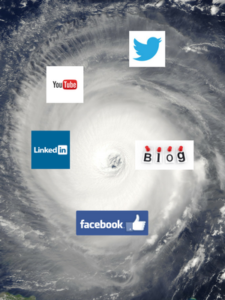 The most well-known online reputation problems typically fall into a category that I refer to as “catastrophic.” Many people make online mistakes each day, but only a few online errors will spiral out of control, go viral and end-up causing economic damage or personal misfortune. An online catastrophe gets widely shared, makes the news and has people talking — sometimes laughing.
The most well-known online reputation problems typically fall into a category that I refer to as “catastrophic.” Many people make online mistakes each day, but only a few online errors will spiral out of control, go viral and end-up causing economic damage or personal misfortune. An online catastrophe gets widely shared, makes the news and has people talking — sometimes laughing.
We have seen many examples:
- An executive writes an inappropriate tweet and loses her job.
- A public company CFO accidentally leaks insider information on his Twitter account – drawing attention from investors and regulators alike.
- A pilot suggests one of the presidential candidates should be executed – drawing a suspension and forcing the airline to explain why the guy belongs on the payroll.
- A professional athlete publishes a picture of his junk on social media (too many to mention.)
In these worst-case scenarios, a social media post gets shared, catches the eye of mainstream media outlets and then ends up everywhere. They are the most difficult to manage.
Here a few key points to consider when dealing with an online catastrophe.
Being old school is not an excuse. I spoke with a gentleman who had a well-documented public meltdown that went viral. He was surprised by the fallout and couldn’t believe that a faceless online mob was attacking him. He had avoided the world of “newfangled” social media sites and was stunned when his rant exploded into a YouTube sensation. The lesson: Ignore social media at your peril and don’t expect people to cut you a break just because you have avoided the social media universe.
You don’t get to be right. When your reputation is in a death spiral, it usually doesn’t matter if you were right or not, as your actions have already been judged indefensible by the court of public opinion. This is often very difficult for the offenders to understand. They want to fight and argue that their words were misconstrued – even though they were clearly published in digital ink. Arguing nuanced points while trying to prove yourself right is akin to rearranging the deck chairs. It’s too late, so suck it up and move on. Even if you believe “in your heart of hearts” that you were deeply misunderstood, the best course remains to move ahead as if you were wrong – which you probably were.
Retract and delete. If you screw up and make a mistake online, try to retract or delete the post. If it is on your own social media account or blog, this may be simple. Deleting the negative information not only prevents people from seeing it in the future, but it is also a tacit admission of guilt. In catastrophic cases, offending posts get shared quickly and the original author loses control, so deleting the original message won’t make your problem go away – but it will signal to others that you realized you made a mistake.
Apologize. We live in a forgiving society and our species has a tremendous capability to absolve people of their mistakes. However, we will only forgive if you are contrite. So, if you screw up, say you are sorry. Don’t use double talk and pretend that you are sorry. Saying that you are “sorry if I offended you,” is not the same thing as using the actual words “I’m sorry.”
Make your point and then let it ride. If you are in a catastrophic situation, you need to make your apology, try to explain yourself in a clean manner and then step away. Take a position that you feel comfortable with in the long term and then let it ride. To continue to fight the online mob will only make things worse. Remember, you don’t get to be right and the process is typically unfair. You won’t get equal time, and the short-term battles can’t be won. The best strategy is to let the story play out in the public consciousness and then deal with the damage. This is not to say that days, weeks or months down the road you can’t try to explain yourself. In the short-term, however, it’s best to make your statement and then back away.
Once the dust has settled, you can then start the process of dealing with the online damage. It may be possible to get some content removed — the “black ops” of online reputation management will blow your mind — and it may pay to work to push down and suppress negative content. Each situation is a little bit different, but you can come back from a catastrophe if you follow a smart and credible plan.
Preventing an online catastrophe is a completely different topic. In fact, I wrote a book about it called How to Protect (Or Destroy) Your Reputation Online.
In another installment of my blog, I will address good strategies for having a sterling online reputation that will help you avoid the damages of an online catastrophe.
–John